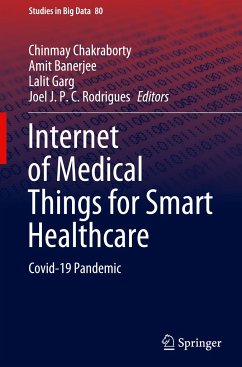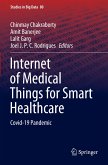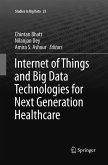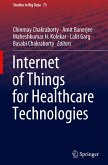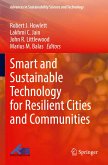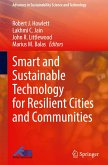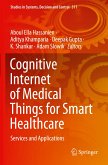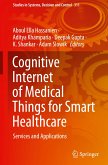Internet of Medical Things for Smart Healthcare
Covid-19 Pandemic
Herausgegeben:Chakraborty, Chinmay; Banerjee, Amit; Garg, Lalit; Rodrigues, Joel J. P. C.
Internet of Medical Things for Smart Healthcare
Covid-19 Pandemic
Herausgegeben:Chakraborty, Chinmay; Banerjee, Amit; Garg, Lalit; Rodrigues, Joel J. P. C.
- Gebundenes Buch
- Merkliste
- Auf die Merkliste
- Bewerten Bewerten
- Teilen
- Produkt teilen
- Produkterinnerung
- Produkterinnerung
This book covers COVID-19 related research works and focuses on recent advances in the Internet of Things (IoT) in smart healthcare technologies. It includes reviews and original works on COVID-19 in terms of e-healthcare, medicine technology, life support systems, fast detection, diagnoses, developed technologies and innovative solutions, bioinformatics, datasets, apps for diagnosis, solutions for monitoring and control of the spread of COVID-19, among other topics. The book covers comprehensive studies from bioelectronics and biomedical engineering, artificial intelligence, and big data with a prime focus on COVID-19 pandemic.…mehr
Andere Kunden interessierten sich auch für
![Internet of Medical Things for Smart Healthcare Internet of Medical Things for Smart Healthcare]() Internet of Medical Things for Smart Healthcare134,99 €
Internet of Medical Things for Smart Healthcare134,99 €![Internet of Things and Big Data Technologies for Next Generation Healthcare Internet of Things and Big Data Technologies for Next Generation Healthcare]() Internet of Things and Big Data Technologies for Next Generation Healthcare127,99 €
Internet of Things and Big Data Technologies for Next Generation Healthcare127,99 €![Internet of Things for Healthcare Technologies Internet of Things for Healthcare Technologies]() Internet of Things for Healthcare Technologies127,99 €
Internet of Things for Healthcare Technologies127,99 €![Smart and Sustainable Technology for Resilient Cities and Communities Smart and Sustainable Technology for Resilient Cities and Communities]() Smart and Sustainable Technology for Resilient Cities and Communities134,99 €
Smart and Sustainable Technology for Resilient Cities and Communities134,99 €![Smart and Sustainable Technology for Resilient Cities and Communities Smart and Sustainable Technology for Resilient Cities and Communities]() Smart and Sustainable Technology for Resilient Cities and Communities134,99 €
Smart and Sustainable Technology for Resilient Cities and Communities134,99 €![Cognitive Internet of Medical Things for Smart Healthcare Cognitive Internet of Medical Things for Smart Healthcare]() Cognitive Internet of Medical Things for Smart Healthcare149,99 €
Cognitive Internet of Medical Things for Smart Healthcare149,99 €![Cognitive Internet of Medical Things for Smart Healthcare Cognitive Internet of Medical Things for Smart Healthcare]() Cognitive Internet of Medical Things for Smart Healthcare213,99 €
Cognitive Internet of Medical Things for Smart Healthcare213,99 €-
-
-
This book covers COVID-19 related research works and focuses on recent advances in the Internet of Things (IoT) in smart healthcare technologies. It includes reviews and original works on COVID-19 in terms of e-healthcare, medicine technology, life support systems, fast detection, diagnoses, developed technologies and innovative solutions, bioinformatics, datasets, apps for diagnosis, solutions for monitoring and control of the spread of COVID-19, among other topics. The book covers comprehensive studies from bioelectronics and biomedical engineering, artificial intelligence, and big data with a prime focus on COVID-19 pandemic.
Produktdetails
- Produktdetails
- Studies in Big Data 80
- Verlag: Springer / Springer Nature Singapore / Springer, Berlin
- Artikelnr. des Verlages: 978-981-15-8096-3
- 1st edition 2020
- Seitenzahl: 320
- Erscheinungstermin: 10. November 2020
- Englisch
- Abmessung: 241mm x 160mm x 23mm
- Gewicht: 590g
- ISBN-13: 9789811580963
- ISBN-10: 9811580960
- Artikelnr.: 59889712
- Herstellerkennzeichnung Die Herstellerinformationen sind derzeit nicht verfügbar.
- Studies in Big Data 80
- Verlag: Springer / Springer Nature Singapore / Springer, Berlin
- Artikelnr. des Verlages: 978-981-15-8096-3
- 1st edition 2020
- Seitenzahl: 320
- Erscheinungstermin: 10. November 2020
- Englisch
- Abmessung: 241mm x 160mm x 23mm
- Gewicht: 590g
- ISBN-13: 9789811580963
- ISBN-10: 9811580960
- Artikelnr.: 59889712
- Herstellerkennzeichnung Die Herstellerinformationen sind derzeit nicht verfügbar.
Dr. Chinmay Chakraborty is an Assistant Professor (Sr.) in the Department of Electronics and Communication Engineering, BIT Mesra, India. His primary areas of research include Wireless body area network, Internet of Medical Things, point-of-care diagnosis, Wireless Networks, Telemedicine, m-Health/e-health, and Medical imaging. Dr. Chakraborty is co-editing Eight books on Smart IoMT, Healthcare Technology, and Sensor Data Analytics with CRC Press, IET, Pan Stanford, and Springer. He received a Young Research Excellence Award, Global Peer Review Award, Young Faculty Award, and Outstanding Researcher Award. Dr. Amit Banerjee joined the Advanced Device Research Division, Research Institute of Electronics, Shizuoka University, National University Corporation, Japan as a Scientific Researcher in 2016 and was also part of the Innovative Photonics Evolution Research Center at Hamamatsu, Japan. He later joined the Microelectronic Technologies & Devices, Department of Electrical and Computer Engineering of the prestigious National University of Singapore, as Scientist in 2017. Currently Amit is member of 30+ international advisory boards, including Ocuro Science and Technology (biomed-startup); Ominar Innovations (biomed-startup); EDGE196, EntrepreneursFace, Digivalley Innovations; ULVAC Technologies Inc, ISF Analytica & Informatica; Asentrex Global, Arohan Educan Ltd. London, UK; Ambassador, Bentham Science Publishers, among others. Amit holds Ph.D. degree in Semiconductor Technology and has co-authored several scientific papers, presented in several international conferences as plenary and keynote speakers, received several national/international awards, edited seven books. His current work is on THz detectors, compatible with the state-of-the-art medium-scale semiconductor device fabrication processes, with commercial viability as on-chip integrable detector arrays for terahertz imaging. Dr. Lalit Garg is a Senior Lecturer in Computer Information Systems at the University of Malta, Malta. He is also an Honorary Lecturer at the University of Liverpool, UK. His research interests are missing data handling, machine learning, data mining, mathematical and stochastic modeling, operational research, and their applications, especially in the healthcare domain. He has published over 80 technical papers in refereed high impact journals, conferences, and books and has more than 500 citation count to his publications. He has organized many conferences and also delivered keynotes in many other conferences. Prof. Joel J. P. C. Rodrigues [S'01, M'06, SM'06, F'20] is a professor at the Federal University of Piauí, Brazil; senior researcher at the Instituto de Telecomunicações, Portugal; and collaborator of the Post-Graduation Program on Teleinformatics Engineering at the Federal University of Ceará (UFC), Brazil. He is theleader of the Next Generation Networks and Applications (NetGNA) research group (CNPq), an IEEE Distinguished Lecturer, Member Representative of the IEEE Communications Society on the IEEE Biometrics Council. He was Director for Conference Development - IEEE ComSoc Board of Governors, a Past-Chair of the IEEE ComSoc TCs on eHealth and on Communications Software. He is the editor-in-chief of the International Journal of E-Health and Medical Communications. He has authored or coauthored over 900 papers in refereed international journals and conferences, 3 books, 2 patents, and 1 ITU-T Recommendation. Senior member of ACM and Fellow of IEEE.
Chapter 1. Transmission Dynamics and Estimation of Basic Reproduction Number (R0) from Early Outbreak of Novel Coronavirus (COVID-19) in India.- Chapter 2. Covid -19 analysed by using machine deep learning.- Chapter 3. MML Classification Techniques for the pathogen based on pnuemonia-nCOVID-19 and the Detection of closely related lung diseases using Efficacious Learning Algorithms.- Chapter 4. Diagnosing COVID-19 Lung Inflammation using Machine Learning Algorithms: A Comparative Study.- Chapter 5. Factors Affecting the Success of Internet of Things for Enhancing Quality and Efficiency Implementation in Hospitals Sector in Jordan during the crises of Covid-19.- Chapter 6. IoMT based Smart Diagnostic/Therapeutic Kit for Pandemic Patients.- Chapter 7. The Prediction Analysis of Covid-19 Cases using ARIMA and KALMAN Filter Models: A Case of Comparative Study.- Chapter 8. Exploration of cough recognition technologies grounded on sensors and artificial intelligence.- Chapter 9. A Review on use of Data Science for visualisation and prediction of the COVID-19 Pandemic and Early diagnosis of COVID-19 using Machine learning models.- Chapter 10. Fuzzy Cellular Automata Model For Discrete Dynamical System Representing Spread ofMERS And COVID-19 Virus, SumitaBasu and Sreeya Ghosh.
Chapter 1. Transmission Dynamics and Estimation of Basic Reproduction Number (R0) from Early Outbreak of Novel Coronavirus (COVID-19) in India.- Chapter 2. Covid -19 analysed by using machine deep learning.- Chapter 3. MML Classification Techniques for the pathogen based on pnuemonia-nCOVID-19 and the Detection of closely related lung diseases using Efficacious Learning Algorithms.- Chapter 4. Diagnosing COVID-19 Lung Inflammation using Machine Learning Algorithms: A Comparative Study.- Chapter 5. Factors Affecting the Success of Internet of Things for Enhancing Quality and Efficiency Implementation in Hospitals Sector in Jordan during the crises of Covid-19.- Chapter 6. IoMT based Smart Diagnostic/Therapeutic Kit for Pandemic Patients.- Chapter 7. The Prediction Analysis of Covid-19 Cases using ARIMA and KALMAN Filter Models: A Case of Comparative Study.- Chapter 8. Exploration of cough recognition technologies grounded on sensors and artificial intelligence.- Chapter 9. A Review on use of Data Science for visualisation and prediction of the COVID-19 Pandemic and Early diagnosis of COVID-19 using Machine learning models.- Chapter 10. Fuzzy Cellular Automata Model For Discrete Dynamical System Representing Spread ofMERS And COVID-19 Virus, SumitaBasu and Sreeya Ghosh.

